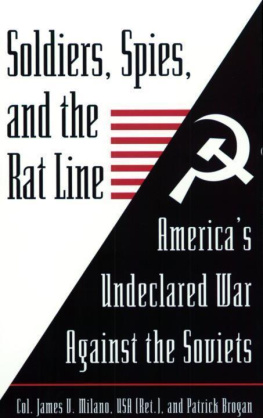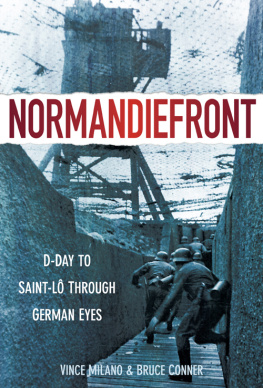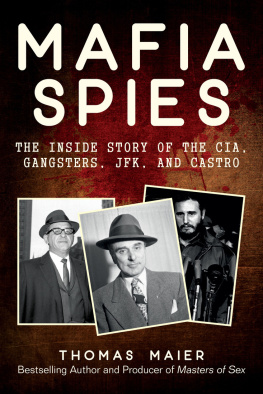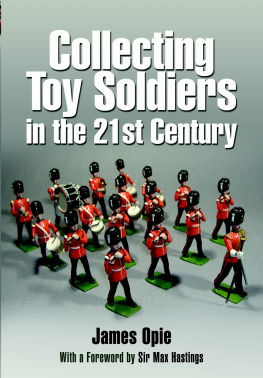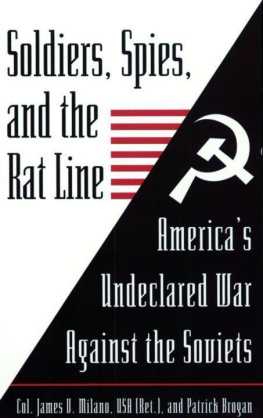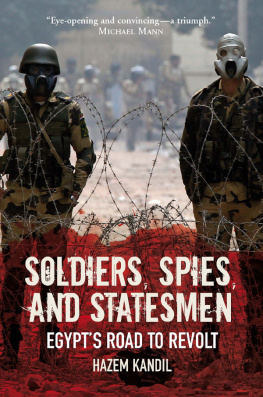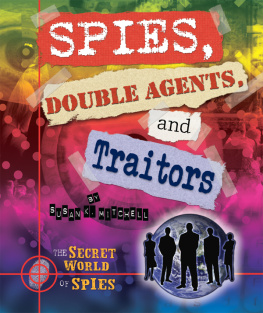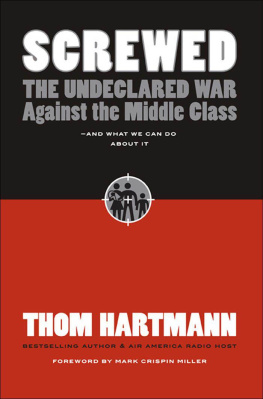America's Undeclared War Against the Soviets
Col. James V. Milano, USA (Ret.) and Patrick Brogan


This book is dedicated to the members of the intelligence community
who served with the U.S. Army in Austria following World War II.
They were a group of talented and dedicated people who lived and
worked under the growing cloud of the cold war. Their contributions
greatly aided the American government's understanding of the
Soviet threat that led to more than four decades of global
confrontation and conflict.
...............................................Ix
.............................................................xi
..............................1
............................. 19
.................................29
...........................................43
................................55
....................................81
..................................95
............... 105
...................... 131
.................. 147
................... 155
..................................... 171
......................... 177
....................... 191
..............................201
........................................................223
.............................................................229
I would like to thank my son, James, for his valuable assistance in planning and organizing the initial phase of the project. Also, John B. Burkel, former agent in charge of the Counter-Intelligence Corps in Salzburg, Austria, during those exciting days. John was most helpful in recalling many of the details of those times.
I am most grateful for the clerical assistance extended by Anna Amato, our office coordinator at Pfizer Aviation.
Last, special thanks to my wife, Ann, for her patience and understanding. We spent those years together in Salzburg when, due to security restrictions, she had virtually no knowledge of what I was doing. Fellow workers came to the house after office hours, and she was never included in the conversations. Telephone calls to report to the code room often came in the middle of the night, and she endured many lonesome hours due to my extensive meetings after work.
-James V. Milano
This is a story of the secret beginnings of the cold war in Europe. It concerns intelligence operations carried out for the U.S. Army in Austria immediately after World War II-before the CIA came on the scene-and the "Rat Line" that was used to smuggle Soviet deserters to South America. The operation was kept secret from civil officials of the U.S. government, and from most military officers, and remained hidden for nearly forty years.
It is Jim Milano's story. He was a young intelligence officer with the American army in Italy that fought its way from Sicily to the Alps and then undertook the occupation of Austria. He directed American military intelligence against Soviet targets from 1945 to 1950, and established the Rat Line. The line's existence, and Milano's role in it, emerged in 1983 when the public learned of the case of Klaus Barbie. Barbie was a Nazi war criminal who had been smuggled out of Germany in 1951 by American officers there and who used the escape route that had been set up by their colleagues in Austria. Milano had left Europe by then and never heard of Barbie until the case became public decades later. The Rat Line, while he operated it, was never used by war criminals; it was reserved exclusively for Soviet defectors and their families. His successors in Austria, at the bidding of their associates in Germany, broke that rule. There was a great outcry in the United States when the public learned that U.S. Intelligence had employed Barbie and had then sent him to safety in South America to escape prosecution for war crimes. The Justice Department held an inquiry. Jim Milano was interviewed and gave an account of his activities in the postwar period and a history of the Rat Line. The inquiry concluded that between 1945 and 1950 the Rat Line may have acted with dubious legality, but did not help war criminals. Milano and his team had nothing to do with Klaus Barbie.
Now Jim Milano has told his own story of those dramatic events. No files survive of the Rat Line or any of the other operations he directed. After forty-five years, a great many of those who had a part to play have died, and very many details of their secret campaigns, their triumphs and failures, have been lost for good. Old men forget, but he offers his imperfect recollections as the best record still available of this corner of modern history. He gave these and his papers to Patrick Brogan, a writer living in Washington. These are Jim Milano's memoirs as recounted by Patrick Brogan, which is why the book is cast in the third person. The authors did not want a "ghostwritten" book like the memoirs of politicians, film stars, or prominent businessmen in which the purported author puts his name to someone else's work.
In writing the story for Milano, Brogan has checked whatever details can still be confirmed after such a long interval, and has added some background as well as details of the Barbie case, which all appear in their appropriate place. The conversations are obviously reconstructions based upon Milano's best recollection. Some of the incidents recounted were only partly to be recovered, but nothing was invented, nothing added. Jim Milano was no James Bond, but this is a true story of the real world of intelligence during the most dangerous period of the cold war.
James V. Milano
Patrick Brogan
In the fall of 1948, a dilapidated Italian freighter made the long, slow voyage from Genoa in Italy to Valparaiso in Chile. It was a sign, one of many, that life and trade were reviving after the bloody interruption of the war. The ship was in no other way significant, the general goods she carried were not at all remarkable, and all the world's governments and intelligence services ignored her. But there were also passengers on board, refugees or emigrants who were ready to put up with the great discomforts and delays of the cargo line. It was the cheapest and least conspicuous way to escape from the grim reality of postwar Europe to the peaceful, different, and vaguely exotic world across the oceans. It had been autumn when they had left Italy, with its promise of another cold, uncertain winter, but they would arrive in the spring of the southern hemisphere to blue skies, a new life, and renewed hopes.

